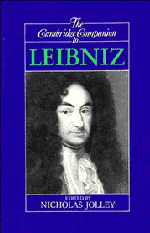Book contents
- Frontmatter
- 1 Introduction
- 2 G. W. Leibniz, life and works
- 3 The seventeenth-century intellectual background
- 4 Metaphysics: The early period to the Discourse on Metaphysics
- 5 Metaphysics: The late period
- 6 The theory of knowledge
- 7 Philosophy and logic
- 8 Philosophy and language in Leibniz
- 9 Leibniz
- 10 Leibniz's ontological and cosmological arguments
- 11 Perfection and happiness in the best possible world
- 12 Leibniz's moral philosophy
- 13 The reception of Leibniz in the eighteenth century
- Bibliography
- Index
12 - Leibniz's moral philosophy
Published online by Cambridge University Press: 28 May 2006
- Frontmatter
- 1 Introduction
- 2 G. W. Leibniz, life and works
- 3 The seventeenth-century intellectual background
- 4 Metaphysics: The early period to the Discourse on Metaphysics
- 5 Metaphysics: The late period
- 6 The theory of knowledge
- 7 Philosophy and logic
- 8 Philosophy and language in Leibniz
- 9 Leibniz
- 10 Leibniz's ontological and cosmological arguments
- 11 Perfection and happiness in the best possible world
- 12 Leibniz's moral philosophy
- 13 The reception of Leibniz in the eighteenth century
- Bibliography
- Index
Summary
More than twenty years ago, Carl J. Friedrich offered this rather deflationary assessment of Leibniz's significance as a legal and political philosopher - that he was not “a thinker of the first rank on law and politics; no basically novel insight can be attributed to him.” Indeed, it must be admitted that Leibniz followed a traditional Christian reading of the divisions of natural law expounded in the Institutes of Justinian's Code (completed in 529 and revised in 534). It is also true that he resisted the trend toward independent sovereign states in favor of a return to a unified respublica christiana, to be achieved by revitalizing that practically defunct offspring of the medieval marriage of church and state, the Holy Roman Empire. But it must also be said that he developed a profound and inventive philosophical underpinning for the conventional legal wisdom.
- Type
- Chapter
- Information
- The Cambridge Companion to Leibniz , pp. 411 - 441Publisher: Cambridge University PressPrint publication year: 1994
- 6
- Cited by

